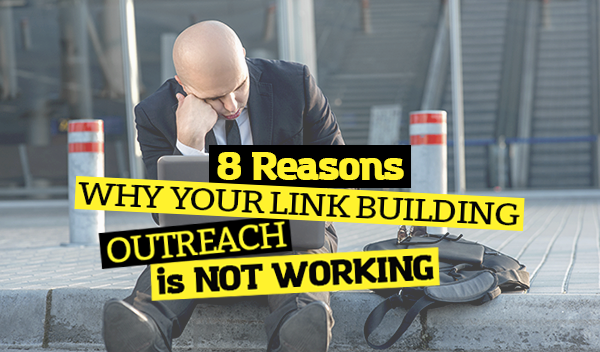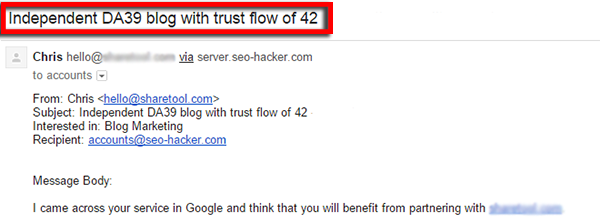8 Reasons Why your Link Building Outreach is not Working
Have you been link building for years now? Then perhaps you’re also doing outreach for years, still with the hope that your contribution will be accepted.
And still, it isn’t working.
Three years ago, I was blessed to be part of SEO Hacker’s family, in which I started as a link builder. As expected, it wasn’t easy, especially with the fact that link building, and SEO in general is not something being taught in school.
I was clueless.
The good thing about it is that you can learn it along the way – experiences will teach you. Reading will never be enough. You really have to do it.
And so I plunged in.
But for weeks since I started, I’m still not getting the response I’m hoping from the webmasters. I’m still not doing link building because there are no links being built at all.
It was then I learned that link building is more than just about planting links, knowing how to send an email, and prospecting websites where you can build tons of links. It’s a process, and each step requires time and dedication.
And in the process, I saw that the ‘outreaching’ part is actually the hardest amongst all the others (yes, harder than prospecting, and writing a guest post), and that’s where I’m failing.
However, it didn’t stop me. In fact, it only shook me enough to make me try different approaches to see what’s really working. Eventually, I found out what’s working, and this gave me the highest guest post acceptance rate in our team back then (and yes, that’s a bragging right).
Now that I’m handling the SEO Hacker blog and the one receiving guest post requests, it brings back memories. And what’s so funny and interesting is that there are still so many link builders doing the same mistakes I did before.
All those mistakes and (of course) ways to be redeemed from them will be discussed in this post.
Let’s dig in!
8 Reasons Why your Link Building Outreach is not Working
1. You don’t take time to personalize
Yes, you got it right!
First is always about personalization. Because it’s true, with tons of emails we’re receiving each day, we don’t have much time to read emails that are not interesting, moreover, emails that are not addressed to us – or technically addressed to us, but they didn’t make it so obvious.
Personalization is not just about inserting names – it starts with your subject line.
For example, it’s not good to do this:
Instead, make your subject line so creative and catchy that they will surely open it.
Some points to remember when creating your subject line:
a. Keep them in lower cases, as if you’re emailing a friend. Unless you email a friend like you’re always mad.
b. Intriguing subject line like this
usually get clicked, but be careful not to mislead your recipients, as they might put you in spam folder. Better make it direct to the point, like this:
The other way to make your email personalized is to (of course) include the name.
When I’m receiving emails with only ‘Hi!’ or ‘Hey!’, I knew right then that the sender doesn’t even make an effort to know who they’re sending emails to. I mean they could’ve just put ‘Hey Pam!’, or ‘Hi Sean!’.
And the funny part is that the next line is: “I’ve been reading your blog for quite sometime now.”
And I was like, “Oh really? How come you don’t know our names? Maybe you need a bit more reading.”
Don’t do the same mistake.
We know that most guest contributions we’re receiving are after the link. But even with that desire, it pays to put effort with your outreach and understand what kind of website you’re trying to reach out. I will discuss more of that later.
If you’re struggling to find names, here are ways to help you.
- Check the About page/section
- Check the social profiles. Bloggers sometimes include their personal social media profiles in their websites.
- Use Buzzstream. One of the amazing features of Buzzstream for Link Building is that it automatically discover contact information for you – all you need to do is to input URLs.
- Check who’s writing in the blog.
2. There are too many grammatical errors and misspellings in your email
Emails with too many grammatical errors or misspellings automatically turns off webmasters because (seriously) how will they trust that you can create a great article if you can’t perfect a simple email?
I know how exciting it could be to hit the ‘send’ button. But before you do so, proofread your email first.
Tips: Avoid grammatical errors, misspellings, and try to keep your email short – just be direct to the point.
3. You’re not offering value to their audience
What I’m saying is that it’s important to know what kind of website you’re reaching out to. It’s not just about the niche, but also the contents they’re sharing, how they deliver it, and how the audience are responding.
When you’re trying to pitch a content, you always have to consider the audience.
Will they benefit from it? Will they like it? Will they share it?
So, when sending emails, it’s better if you could include the benefits of your contribution and why you think that website’s audience will like and share it.
4. You don’t take time to follow up
I overlooked a lot of emails, and that’s because I’m receiving hundreds of them everyday. I’m sure that most webmasters are experiencing the same thing.
That’s why following up is very important. If done right, it can definitely increase reply rate by 100%.
Never ever send a follow up email like this.
Instead, follow up in a polite manner. After all, you’re the one who needs the favor. Understand that they might be busy and might have overlooked your email.
Your follow up email should sound like this:
Now, you should not only follow up to those who are not responding, but also to those who accepted but haven’t (or forgotten) to publish your contribution.
Follow-up is a very crucial part of outreach because it can either increase reply rate, or decrease your leads. So make it count.
5. You just disappear after they publish your contribution
So now you got what you’re asking for.
How about a ‘thank you’ and ‘I will definitely share this post to my community’.
But instead you just disappear.
As a guest contributor, it’s also your responsibilities to share your post in social channels or your online community and to reply to comments, because who knows better than your post but you?
Also, engaging even after they publish your guest post is very necessary and helpful (to you) in so many way.
- You can definitely ask another favor.
- You’re building a relationship that is definitely advantageous in the long run.
- You’re telling webmasters that you’re not just after the links, which will build trust.
- By replying to comments, you’re also building your name, as well as your website and brand.
6. You’re not willing to help
In years of doing link building, I learned that it’s not something you can do overnight. Because link building is also relationship building, and you need time for it.
If you can ask for a favor, you should also be willing to return it. Successful link builders, meanwhile, actually give favors first before even asking for one.
How to do it? Simple.
Step 1: Prospect – you know the usual first step.
Step 2: Follow your prospects. Follow them in social media, blogs and other communities – not in a creepy way. Enough that you’re updated with their lives.
Step 3: Share their post. If they are promoting something (a blog post, a product), use it and share with your followers as well.
Step 4: Comment on their posts or engage in their communities. When they can see you in comment feed, they wouldn’t be so shocked if one day you reach out to them. Also, engaging in their communities is also a way to introduce yourself.
If you can do these, then you’ll be more confident that your emails wouldn’t be ignored or even be prioritized because some webmasters may feel like they owe you something.
7. You’re not a real human
I understand that some link builders use personas, but personas shouldn’t stop you from being a real human.
If you don’t want to look like a bot, make sure to build your identity by:
- Creating and updating your social media accounts.
- Being active in online communities.
- You have a valid email address, not xnqytgu@seo-hacker.com.
- You have a website that people can visit and see your written works, basically an online portfolio.
8. You’re not following guidelines
There are websites that have specific guidelines when it comes to guest post contribution. Follow them.
Usually these websites require you to:
- Put a specific subject line, so they know right then what you need.
- Send your email to a specific email address.
- Send your email together with the article.
- Pitch topics first.
Whatever the guidelines may be, it will definitely increase reply rate if you can comply.
Final thought
Most link builders get exhausted and frustrated with what they’re doing simply because they’re not getting the results successful link builders have. But before you give up, take time to evaluate your processes first and see where you’re lacking. If it’s your outreach efforts, perhaps you’re committing these awful mistakes.
Now you know that there are ways to correct them.





